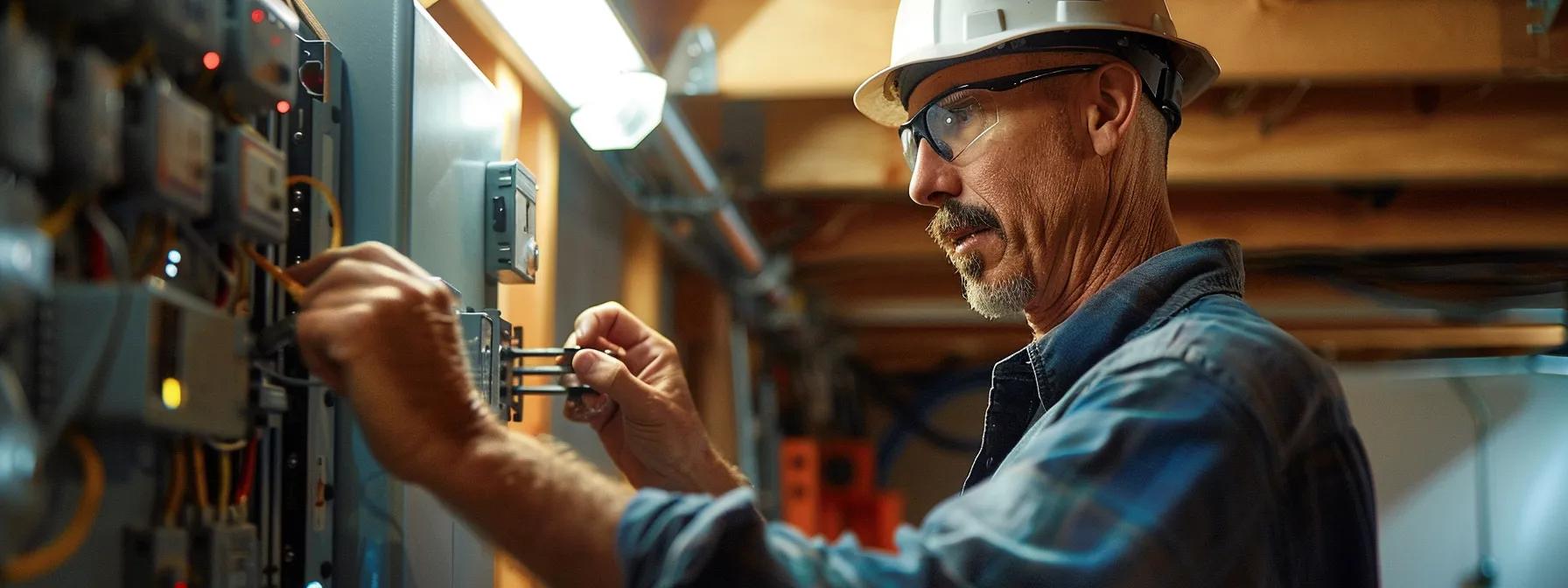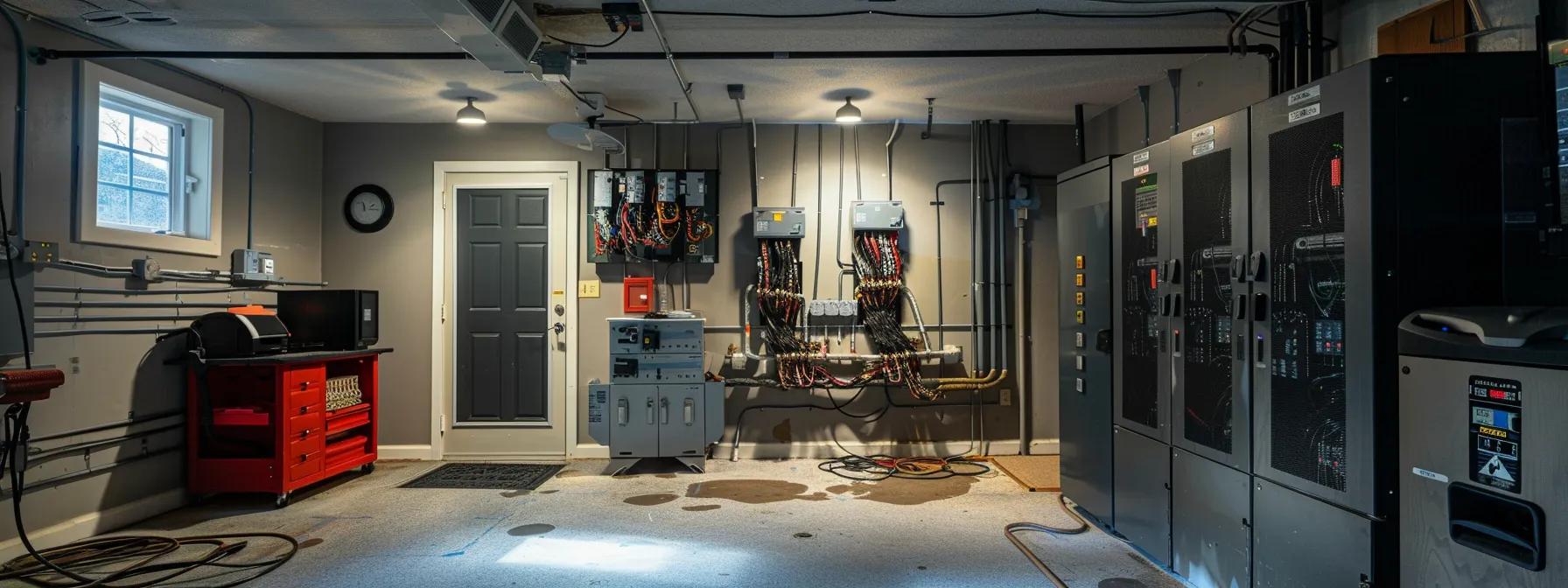What to Expect During a Home Electrical Inspection in Central Kentucky
An electrical inspection in Central Kentucky is vital for homeowners, landlords, and small business owners to ensure electrical safety, proper installation, and code compliance. This article outlines what to expect during an inspection, detailing the primary purposes, key components examined, code compliance issues, preparation steps, report interpretation, and tips for selecting a qualified inspector.
Understanding the Purpose of Your Central Kentucky Electrical System Review
The main goal of an electrical inspection in Central Kentucky is to identify safety hazards, verify that installations meet required standards, and support insurance or financing requirements. Inspectors review wiring and systems for compliance with both local ordinances and the National Electrical Code (NEC).
Identifying Safety Hazards Before They Become Problems
Inspections help detect hazards such as overloaded circuits, deteriorated wiring, and malfunctioning safety devices. Early detection allows inspectors to recommend repairs that prevent potential fire risks, electrocution, and other hazardous conditions.
Ensuring Your Home Meets Current Electrical Standards
Regular reviews ensure that wiring, outlets, panels, and other components meet evolving electrical codes. Compliance with the latest standards reinforces system performance and prevents hazards related to outdated or improperly installed components.
The Role of an Electrical Inspection in Lexington Home Purchases
For homebuyers in Lexington, an electrical inspection is critical during due diligence. The inspector’s report can uncover repair needs and influence pricing negotiations by providing a clear picture of the home’s electrical condition.
Peace of Mind Through Thorough Electrical System Assessment
A completed electrical inspection offers homeowners reassurance that their wiring and safety systems function correctly. This assurance helps reduce the risk of future malfunctions and ensures reliable home operation.
How Inspections Support Insurance and Financing Requirements
Many insurers and lenders require recent electrical inspection reports to confirm compliance with safety standards. A clean report can lower premium rates and simplify financing processes while protecting property owners from unexpected costs.
Key Components Examined by a Home Inspection Electrician

During an electrical inspection, the electrician examines several vital components to assess the overall electrical integrity and safety of the property.
Scrutinizing the Electrical Panel and Circuit Breakers
The inspector reviews the electrical panel, checking circuit breakers for proper labeling, functionality, and load distribution. A well-maintained and correctly distributed panel helps prevent short circuits, overloads, and fire hazards.
Assessing Wiring Methods and Conditions Throughout the Property
The condition of the wiring is examined carefully. Inspectors identify signs of wear, outdated installation practices, and materials that may not meet current standards. They review wiring types such as knob-and-tube, aluminum, or modern copper wiring to assess long-term safety and performance.
Testing Outlets, Switches, and Fixtures for Proper Function
Every outlet, light switch, and fixture is checked to ensure proper grounding and function. This testing minimizes risks of electrical shock and addresses issues like flickering lights or damaged wiring connections.
Verifying Grounding and Bonding Systems for Safety
The grounding and bonding components are crucial for preventing voltage surges and reducing the risk of fires or electrocution. The inspector verifies that these systems are intact and installed correctly.
Checking for Appropriate GFCI and AFCI Protection
Inspectors confirm that Ground Fault Circuit Interrupter (GFCI) and Arc Fault Circuit Interrupter (AFCI) devices are installed where required. These devices guard against dangerous electrical faults in areas such as kitchens and bathrooms.
Navigating Ky Code Compliance for Your Electrical Setup
Understanding local and national codes is essential for ensuring that your electrical system operates safely and efficiently.
An Overview of Kentucky’s Specific Electrical Regulations
Kentucky’s electrical regulations, which may differ from national standards, address regional factors like climate and building practices. Inspections always include a review of these local requirements to ensure legal compliance.
How Local Lexington Ordinances Affect Your Inspection
Lexington ordinances can dictate specific installation methods and safety features that exceed national requirements. Compliance with these local rules can affect insurance claims and property valuation.
Common Electrical Code Violations Found in Central Kentucky Homes
Typical violations include outdated wiring, overloaded circuits, and missing safe disconnects. Identifying these issues early allows homeowners to make necessary repairs and maintain safety standards.
Steps to Achieve Full Ky Code Compliance After an Inspection
Corrective actions may involve updating wiring, installing essential safety devices like GFCIs and AFCIs, and properly labeling circuits. Licensed electricians can help bring the electrical system up to current regulatory requirements while improving system efficiency.
The Significance of Adhering to National Electrical Code (NEC) Standards
Compliance with the NEC is crucial even when local codes have deviations. Adhering to NEC guidelines ensures that fundamental safety principles are followed, protecting both property and occupants.
Preparing Your Home for an Electrical Inspection in Lexington

Proper preparation can help ensure an efficient and thorough electrical inspection.
Clearing Access to Electrical Panels and Equipment
Ensure all electrical panels and equipment are easily accessible by moving obstructive furniture and unlocking storage areas. Clear access minimizes the chances of an incomplete inspection.
Making a List of Known Electrical Issues or Concerns
Prepare a list of any observed electrical issues, such as flickering lights or frequently tripping breakers. This helps the inspector focus on potential problems and verify whether they indicate broader system issues.
Ensuring All Areas of the Home Are Accessible to the Inspector
For an effective inspection, clear access to every room, including basements, attics, and crawl spaces, is essential. Hidden hazards in inaccessible areas may otherwise go undetected.
What Information to Have Ready for Your Home Inspection Electrician
Gather documentation like past electrical permits, previous inspection reports, and repair records. Providing these details offers context and helps the inspector assess current compliance accurately.
Simple Fixes You Can Address Before the Inspection Date
Perform simple tasks such as replacing burnt-out bulbs, securing loose wiring covers, and testing outlets. These small fixes can help streamline the inspection and may reduce the number of immediate repair recommendations.
Understanding Your Central Kentucky Electrical Inspection Report
Once the inspection is complete, it is important to understand the report to plan any necessary repairs or upgrades.
Reviewing the Inspector’s Findings and Recommendations
The report details every aspect of the electrical system, noting both urgent repairs and suggested improvements. Diagrams and explanations help clarify which components meet standards and which require attention.
Identifying Urgent Safety Repairs Versus Suggested Upgrades
Reports typically differentiate between safety-critical issues and recommended upgrades. Homeowners can prioritize urgent repairs that mitigate fire risks or electrocution hazards before considering cosmetic or performance enhancements.
How to Interpret Notes on Ky Code Compliance Issues
Notes on the report will highlight areas where the electrical system does not meet Kentucky codes. These annotations provide guidance on the steps needed to achieve full compliance and improve system safety.
Questions to Ask Your Inspector About the Report Details
If any part of the report is unclear, homeowners should ask the inspector for clarification regarding the severity of problems, repair timelines, and possible repair costs.
Using the Report for Negotiations or Planning Repairs
The inspection report is not only a safety tool but also a negotiation aid in real estate transactions. Buyers and sellers can reference the report to discuss repair costs or adjust pricing, and homeowners can use it to plan future upgrades.
Selecting a Qualified Professional for Your Electrical Inspection Lexington Needs

Choosing the right inspector is crucial for accurate assessments and reliable recommendations.
Verifying Credentials and Experience of a Home Inspection Electrician
Confirm that the inspector holds the necessary certifications and licenses. Experience, testimonials, and a proven record of successful inspections are indicators of a qualified professional.
What to Look for in a Central Kentucky Electrical Inspector
A good inspector offers clear communication, a thorough inspection process, and transparent reporting. They should be able to explain technical findings in simple terms so that homeowners understand any issues and recommended actions.
Understanding the Scope of Services Offered
Inspectors may offer basic safety checks or comprehensive diagnostics. Homeowners should know what is included in the service package—from visual inspections to detailed compliance checks—to ensure every aspect of the electrical system is evaluated.
Obtaining Quotes and Comparing Inspection Services
It is advisable to obtain multiple quotes and review customer feedback. While cost is a factor, the thoroughness and quality of the inspection are paramount.
The Value of a Specialist Focused on Electrical Systems
A specialist in electrical safety can provide a deeper evaluation by staying current with code updates and advanced troubleshooting methods. Their expertise is especially valuable for older or complex electrical systems.
Frequently Asked Questions
Q: How long does an electrical inspection typically take? A: An inspection typically takes between 1 to 2 hours, depending on the size and complexity of the electrical system.
Q: What happens if my home fails the inspection? A: If significant issues are detected, the report will list urgent repairs and upgrade recommendations. Follow-up inspections may be required after repairs are completed.
Q: Are electrical inspections required for home insurance or sale? A: Yes, many insurers and lenders require a recent inspection as proof of compliance with safety standards.
Q: Can I perform small repairs before the inspection? A: Absolutely. Addressing minor issues such as replacing bulbs or securing panels can help ensure a smoother inspection.
Q: Is it necessary to hire a specialist for electrical inspections? A: Yes, a specialist offers a thorough review that complies with both local ordinances and national codes, ensuring higher safety standards.
Final Thoughts
An electrical inspection in Central Kentucky provides essential insights into the safety and compliance of a home’s electrical system. It safeguards against hazards, enhances property value, and supports insurance or financing processes. By reviewing key components, addressing code violations, and carefully preparing for the inspection, homeowners can ensure a secure and efficient electrical system. With the guidance of a qualified professional, an electrical inspection is an invaluable investment in long-term home safety and efficiency.

